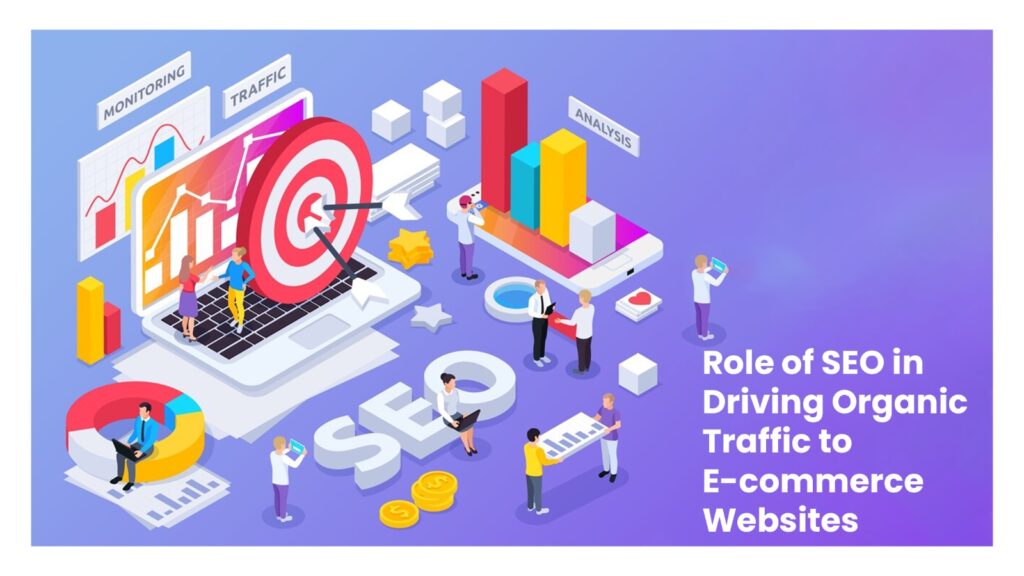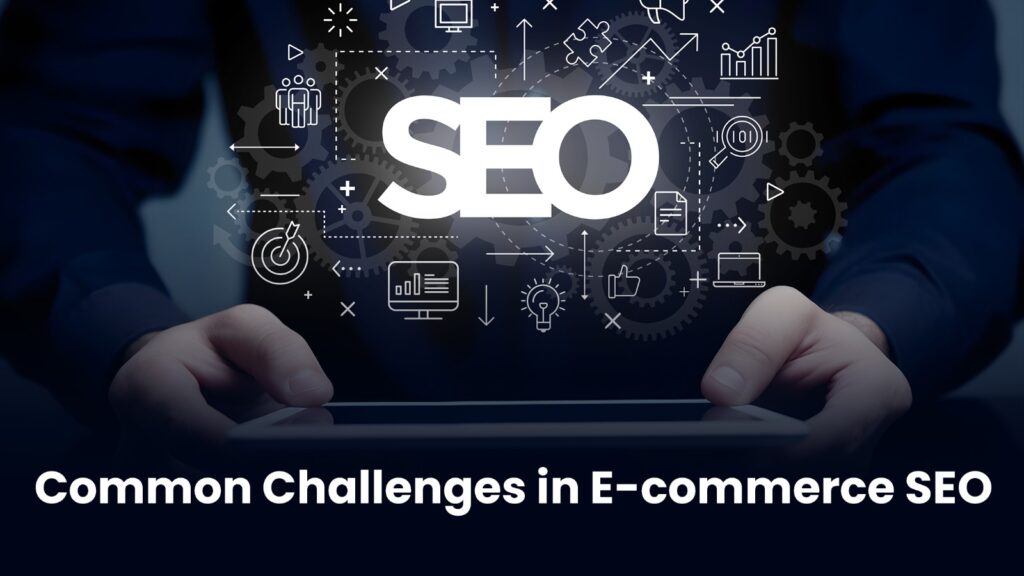The goal of the digital marketing discipline known as search engine optimization, or SEO, is to make a website more visible on search engine results pages. SEO helps a website rank higher by optimizing different components such as keywords, content, and meta tags. This increases organic traffic and the likelihood that a user will find the site.
Making sure a website’s technical elements are search engine friendly is another component of SEO strategies. Effective SEO improves user experience, authority, and credibility in addition to visibility. In summary, it’s an essential tool for companies and individuals looking to optimize their online presence and successfully connect with their target market.
Table of Content
- Brief Overview of SEO
- Significance of SEO in the E-commerce Landscape
- Importance of Keywords in E-commerce SEO
- On-Page and Off-Page SEO Factors
- Role of SEO in Driving Organic Traffic to E-commerce Websites
- SEO and User Experience in E-commerce
- SEO Strategies for E-commerce Success
- Role of Content in E-commerce SEO
- Integrating Social Media with E-commerce SEO
- Common Challenges in E-commerce SEO
- Future Trends in E-commerce SEO
Significance of SEO in the E-commerce Landscape
When it comes to E-commerce, SEO is essential to success. It guarantees increased search engine visibility, bringing in targeted traffic and raising the likelihood of acquiring new clients. Because highly ranked websites are regarded as reliable, SEO increases credibility. Through user experience optimization and keyword concentration, SEO strengthens a website’s edge over competitors in a crowded market. It’s an economical approach that produces long-term benefits and lessens reliance on sponsored advertising. All things considered, SEO is a vital resource for E-commerce companies, providing a route to better exposure, customer confidence, and sustained expansion in the fiercely competitive online market.
Importance of Keywords for E-commerce Websites
To improve search engine rankings and drive targeted traffic, keywords are essential to E-commerce SEO. They make sure that relevant search results for your online store show up, bringing potential buyers to your merchandise. Keywords improve the user experience overall and raise the chance of conversion by comprehending and incorporating the intent of the user. Selecting the appropriate keywords gives your E-commerce site a competitive advantage and makes it stand out in a crowded market. In addition to increasing product discoverability, efficient keyword optimization also improves on-page components like meta tags and product descriptions, which all contribute to the general success and exposure of your online business.
On-Page and Off-Page SEO Factors

Two essential elements of a thorough search engine optimization strategy are on-page and off-page SEO.
On-Page SEO:
To improve your website’s exposure and relevancy to search engines, you should optimize specific elements on your website. Optimizing meta tags (title, description), using content that is both relevant and keyword-rich, building a clear site structure, enhancing page load speed, and utilizing responsive design for mobile compatibility are important on-page components. Better rankings are the result of on-page SEO, which makes sure search engines comprehend the context and content of each page.
Off-Page SEO:
This type of SEO concentrates on outside elements that have an impact on the authority and credibility of your website. The main off-page component is link building, which tells search engines that your website is reliable and valuable by obtaining high-quality backlinks from respectable websites. Off-page SEO is also influenced by brand mentions, social media signals, and online reputation management. Developing a solid online presence and cultivating favorable connections with other websites are essential components of off-page optimization.
Both on-page and off-page SEO are essential elements of a successful digital marketing strategy because they combine to increase a website’s search engine visibility, build credibility, and generate organic traffic.
Role of SEO in Driving Organic Traffic to E-commerce Websites

For e-commerce websites to succeed over the long term in the online market, SEO plays a critical role in generating organic traffic to those websites. This is a synopsis:
Enhanced Visibility: SEO optimizes various on-page and off-page elements to make websites more visible on SERPs. Users who are actively looking for goods and services will be easily able to see the e-commerce website for the same related goods or services.
Keyword optimization: SEO entails carefully selecting keywords and placing them strategically throughout the website. Matching pages with user queries and providing targeted organic traffic aids search engines in comprehending the content and context of individual pages.
Enhanced User Experience: Search engine optimization (SEO) places a strong emphasis on enhancing user experience through mobile responsiveness, faster page loads, and website structure optimization. In addition to being pleasing to search engines, a user-friendly website encourages visitors to explore, interact, and convert.
Credibility and Trust: Users tend to view websites higher up on SERPs as more trustworthy and credible. Reputable link-building techniques and the production of high-quality content are two SEO initiatives that help establish an e-commerce website’s credibility.
Competitive Advantage: A competitive edge can be gained through effective SEO in the cutthroat world of e-commerce. Gaining an advantage over rival websites in search engine rankings enhances the possibility of drawing in new clients, particularly when the website ranks highly on the first page of results.
SEO and User Experience in E-commerce
User experience (UX) and SEO are essential to the success of e-commerce. By optimizing keywords in line with user intent, SEO guarantees visibility. Concurrently, UX concentrates on website architecture and user experience to ensure a smooth client journey. The partnership improves the quality of the content by providing insightful information in an approachable manner. Optimizing a website’s structure for search engines (SERPs) facilitates user navigation and enhances the user experience. Clear calls to action, mobile friendliness, and quickly loading pages all improve user experience and search engine rankings. Increased organic traffic, improved conversion rates, and a more competitive and user-friendly e-commerce platform are the outcomes of a well-balanced SEO and UX strategy.
SEO Strategies for E-commerce Success
Using SEO tactics that work is essential to succeeding in the cutthroat world of online shopping. The following are the Latest SEO Strategies for E-commerce Growth to improve your online store’s performance and visibility:
Research on Keywords: To find high-traffic keywords that are relevant to your products, do in-depth keyword research. Find long-tail keywords and phrases that correspond with user intent by using tools.
Enhanced Product Pages: Craft distinctive and captivating product descriptions, superior images, and pertinent keywords for each product page. Make sure structured data markup and clear product titles are used for search engine comprehension.
Mobile Optimization: Make sure your website is fully optimized for mobile as more people visit e-commerce sites on mobile devices. Mobile-friendly websites are given priority by Google, which affects both user experience and SEO rankings.
Page Load Speed: To improve user experience and meet search engine algorithms, optimize page load speed. To enhance the overall performance of your website, reduce superfluous elements, use browser caching, and compress images.
Content Marketing: Create a plan for content marketing that consists of how-to articles, manuals, and other product-related educational materials. Superior content enhances search engine optimization by drawing in valuable backlinks and keeping users interested.
User-Generated Content: Promote and highlight user-generated content, such as endorsements and product reviews. This helps with SEO efforts by adding new content and establishing credibility.
Local SEO Optimization: To improve your brick-and-mortar store’s online presence, use location-based keywords, build a Google My Business profile, and get local citations. This promotes your physical store to local customers.
Role of SEO in Content for E-commerce
A key component of E-commerce SEO, content fulfills several vital functions and this can be considered as one of the Best SEO tips for E-commerce Websites. It offers a chance to organically incorporate pertinent keywords, increasing search engine visibility. Good product descriptions, blog entries, and educational materials improve user experience and favorably impact purchasing decisions. In addition to drawing in and involving potential clients, captivating content promotes backlinks, which raises the domain authority. Sustained SEO success is facilitated by regularly updated and varied content, which tells search engines that the website is live and relevant. To put it simply, content is essential to building an authoritative, user-friendly, and well-optimized e-commerce website that stands out in the online market.
Integrating Social Media with E-commerce
Social media and e-commerce integration Online visibility and engagement are increased by SEO. In addition to increasing reach, sharing product links and promotions on social media sites like Facebook, Instagram, and Twitter produces important social signals that affect search engine rankings. On social media, promoting user-generated content and client testimonials builds credibility and draws in natural backlinks. Social media profiles frequently rank highly in search results, especially those with a large number of followers, which boosts the SEO of an e-commerce website overall. Social media and SEO work together to generate a powerful synergy that boosts rankings, builds a strong online presence, and drives traffic for e-commerce businesses.
Common SEO Challenges in E-commerce

Because of the dynamic nature of the online marketplace and the complexity of search engine algorithms, e-commerce SEO presents a unique set of challenges. Typical difficulties consist of:
Product Page Optimization: Producing distinctive and captivating product descriptions and titles on individual product pages can be difficult when dealing with large inventories.
Site Organization and Navigation: Maintaining an intuitive and easy-to-use site structure can be challenging, but it’s essential for both search engine optimization and user experience, especially when there are many product categories.
Mobile Optimization: Since mobile friendliness is a major ranking factor, it is challenging to adjust to the growing number of mobile users and ensure seamless mobile optimization.
Dynamic Inventory Change: Regular modifications to the availability, cost, and promotions of products necessitate ongoing updates, which affect SEO efforts and may result in indexing problems.
Technical SEO Challenges: Although handling 404 errors, improving site speed, and putting structured data into practice can be difficult, they are crucial for SEO success.
Finding the Correct Balance Between SEO and User Experience: It can be difficult to strike the correct balance between search engine optimization and preserving a good user experience, especially when doing so may conflict with design principles.
Future Trends in SEO for E-commerce

The future of E-commerce SEO is likely to see several trends shaping the digital landscape. Anticipated trends include:
Artificial Intelligence (AI) Integration: AI technologies, such as machine learning algorithms, will play a significant role in personalized user experiences, content optimization, and predicting user behavior for better-targeted marketing.
Video Content Optimization: With the rise of video content consumption, optimizing product videos for search engines will become crucial. Video SEO strategies will be integral to enhancing visibility and engagement.
Mobile-First Indexing: Google’s emphasis on mobile-first indexing will persist, making mobile optimization even more critical for E-commerce websites to ensure optimal performance and rankings.
User Experience Signals: Search engines will continue to prioritize user experience signals, including page load speed, mobile responsiveness, and overall website usability, as ranking factors.
Structured Data Markup: Utilizing structured data markup, such as Schema.org, will become more prevalent for providing search engines with detailed information about products, prices, and reviews, enhancing rich snippets in search results.
Local SEO Emphasis: The importance of local SEO will persist, especially for E-commerce businesses with physical locations. Optimizing for local search will be crucial for targeting regional and proximity-based queries.
Influencer SEO Collaboration: Collaborations between E-commerce businesses and influencers will extend to SEO strategies, with influencers contributing to backlink building, content promotion, and brand visibility.
Augmented Reality (AR) Integration: The integration of AR in E-commerce will impact SEO, as optimizing AR experiences for search engines will be essential for showcasing products in interactive and immersive ways.
Sustainability and E-A-T: Search engines will likely place more emphasis on sustainability practices and expertise, authority, and trustworthiness (E-A-T) signals. E-commerce sites demonstrating ethical practices and industry authority may receive preferential treatment in rankings.
Conclusion
In conclusion, Top SEO practices for E-commerce Companies play a revolutionary and essential role in shaping the success of online businesses. These practices not only enhance an online store’s visibility but also generate targeted organic traffic, thereby significantly boosting revenue and sales. Ecommerce companies can create a strong online presence in a crowded market by using some optimizing for relevant keywords, enhancing user experience, and keeping up with changing trends. Strategic SEO integration guarantees that businesses are valued and trusted by potential customers in addition to being found. The symbiotic relationship between SEO and E-commerce will remain a cornerstone for digital success, fostering growth, credibility, and sustained competitiveness as search engine algorithms and consumer behaviors change.




